Dental implants and dental bridges are two prominent tooth replacement solutions. The issue is, which solution is best for you?
What is Dental Implant?
Dental implant surgery is a treatment that replaces tooth roots with metal screw-like posts and replaces damaged or missing teeth with false teeth that appear and function similarly to natural teeth. Dental tourists are growing popular among those looking to save money on dental implants, and Vietnam is one of the most popular locations.
Advantages of Dental Implant
Dental implants provide significant benefits over dentures or bridges as tooth replacement solutions. Because the titanium post is placed into the jawbone, dental implants are long-lasting and trustworthy. You do not need to adjust your diet, and chewing is considerably more comfortable since they are extremely robust and can resist the same force as your natural teeth.
Dental crowns, which are composed of porcelain, ceramic, or zirconia to provide you with a more realistic-looking smile, can also boost your beauty and self-confidence.
Unlike dentures, which can shift and become loose over time, dental implants, in addition to reinforcing your jaw, can help prevent atrophy of the jawbone and the tissues around it.
See more: Zirconia Bridge and 5 Tips Should Know
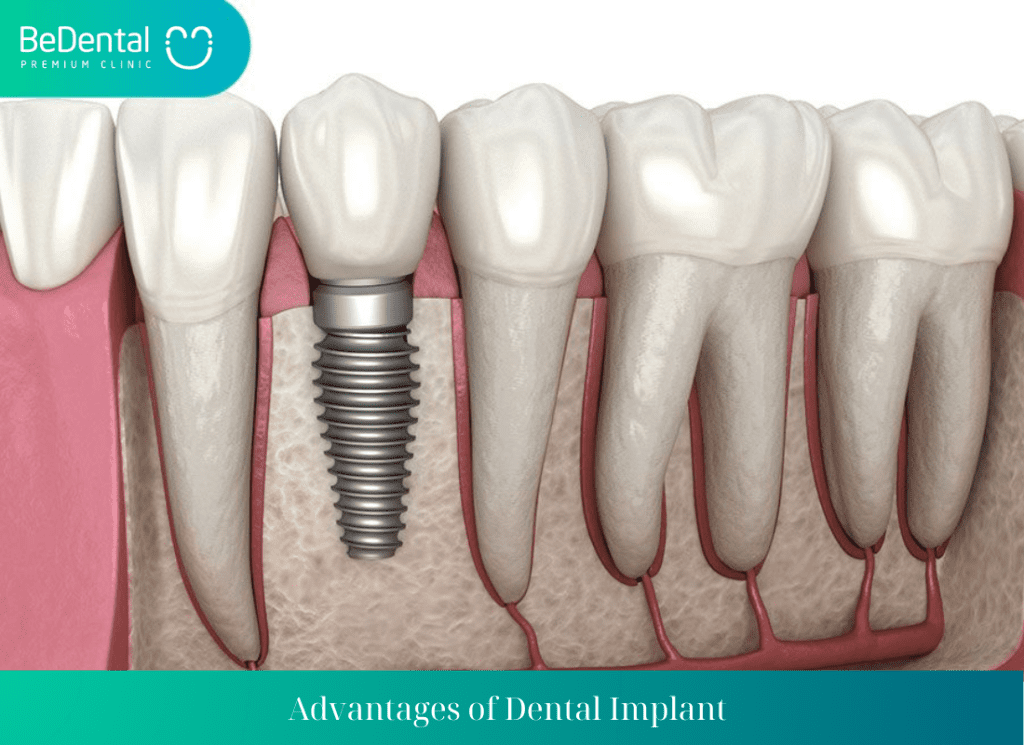
Dental implant
Disadvantages of Dental Implant
Dental implants, while providing a permanent tooth replacement alternative, are not for everyone. Those with narrow jaws, poor dental health, smokers, and those with health issues that interfere with bone repair are frequently ineligible. These are a few drawbacks to consider.
Implants are an expensive operation. A single implant might cost anywhere between $1,000 and $5,000. That is why many individuals go for dental tourism in order to save money.
Most dental insurance policies exclude dental implants. If you are thinking about getting dental implants, you should always check with your insurance company beforehand.
Dental implants, unlike other tooth replacement methods, need oral surgery. As with any surgical operation, there is always the possibility of complications, such as anesthetic issues or infection.
Finally, if you want instant tooth replacement, dental implants are not the ideal alternative.
What is Dental Bridge?
A dental bridge is a false tooth that replaces a missing tooth. It comprises gluing fake teeth to natural teeth that are nearby.
The bridge is made up of one or more crowns on both sides of the gap. Abutment teeth are the anchoring teeth, while pontics are the prosthetic teeth that fill the gap.
Dental bridge types
There are four main types of dental bridges:
- Traditional
- Cantilever
- Maryland
- Implant-supported

Dental cement holds a dental bridge in place.
Dental bridges are also less difficult to install and do not require surgery. Bridges, on the other hand, are less comfortable than implants and do not last as long.
Pros of Dental Bridges
Now that you understand how dental bridges function and the many varieties, consider the following advantages of using a dental bridge over alternative options.
- A dental bridge is less costly than a dental implant since it does not require as much accuracy and is less intrusive to install. Cost is one of the key reasons why some patients prefer bridges to implants.
- Bone grafting is not required. When a tooth is absent for a long time, the jaw bone that supported it in place may have deteriorated or resorbed. Bone grafting is a surgical treatment that strengthens the jaw bone behind the gums by using a false or animal bone fragment. Only implants, not bridges, require it.
- Bridges have several advantages over dentures. Dentists commonly propose bridges instead of dentures if the patient still has adequate good teeth. Healthy teeth can function as anchors for bridges, as opposed to dentures, which must be fastened to the gums with a temporary sealant that is not as stable.
- Bridges are speedier than other options. Because no bone grafting is necessary, bridges are faster to install than implants. Even if just a few implants are utilized to secure the bridge, it is faster than obtaining more implants.
See more: Dentures and 2 types of dentures
Cons of Dental Bridges
There are also some disadvantages to bridges when compared to other options for replacing teeth.
- Conventional bridges require crowns to be placed on completely healthy teeth. The healthy teeth on each side of the bridge must be cut down and capped, which results in some healthy tooth enamel loss. This increases the risk of long-term harm to otherwise healthy teeth.
- Maryland bridges are not sturdy and might cause harm to existing teeth. Since Maryland bridges entail gluing metal to the back of the teeth, they can cause irreversible harm to healthy teeth. These bridges are also less resistant to biting pressure than other bridge designs.
- Implant-supported bridges take longer and are more costly. Because the implants must be put in initially, the procedure might take many months to complete, especially if bone grafting is necessary to strengthen the jaw bone to support the implant. The cost of the two implants on either side of the bridge boosts the overall cost, although it is still cheaper than the cost of receiving all implants.
- Bridges do not restore jaw bone structure. When a tooth is lost or pulled, the supporting jaw bone begins to resorb or disintegrate. Bridges, as opposed to implants, are put above the gum line and have no roots. As a result, unlike implants, bridges do not prevent bone loss.
- Bridges are not as durable as implants. In contrast to implants, bridges are not meant to endure a lifetime. Bridges may not always be able to stay in place permanently due to the eventual damage they cause to the anchor teeth.
Which is better: Dental Implants and Dental Bridges
Dental bridges are prosthetic devices used to replace one or more missing teeth. Metals such as gold, silver, ceramic, or porcelain are typically used. Dental bridges are fastened to the teeth or an implant and may only be removed by a dentist. This differs from removable prosthetic devices such as dentures.
The abutment is the component of a dental implant that holds a bridge in place. Abutments function as bridge anchor points. After that, the pontic, which serves as a substitute tooth, is joined to the bridge, which covers the abutments. If a dental implant is not utilized, a dental bridge is usually joined by first cleaning the teeth’s surfaces to prepare them for the bridgework.
Dental Bridge Structure
Dental bridges come in three varieties: traditional bridges, resin-bonded bridges, and cantilever bridges. Traditional bridges are the most prevalent, and they are frequently built of porcelain that is attached to metal or ceramic materials.
Porcelain is the most commonly used material for crowns and bridges. It is made of a tooth-like substance that may be customized to match the color of your natural teeth. Porcelain may be shaped to look like natural tooth enamel and serve as a strong foundation for your bridge.
Both solutions offer benefits and drawbacks. You must talk with your dentist to determine which choice is best for you.
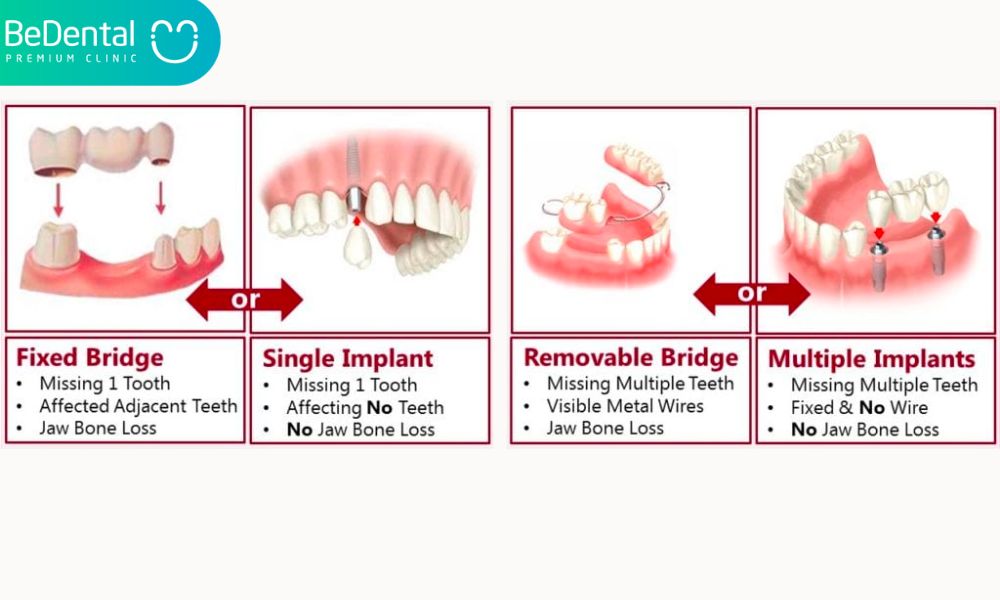
Many aspects must be addressed when selecting between a dental bridge and an implant, including cost, longevity, and simplicity of maintenance.
Cost
Some people may find dental implants to be unreasonably pricey. A single implant can cost several thousand dollars, and the operation to put it can cost hundreds or even thousands of dollars. A dental bridge, on the other hand, is considerably less expensive, with materials and labor often costing only a few hundred dollars.
Dental bridges may not last as long as implants, although often costing less.
Which is better? The answer depends on a number of variables. For instance, an implant is most likely your best choice if you only have one missing tooth. But, if you have numerous teeth missing, getting implants can rapidly become unaffordable. If so, a bridge could be a better choice because it will restore your smile for a lot less money than a dental implant would.
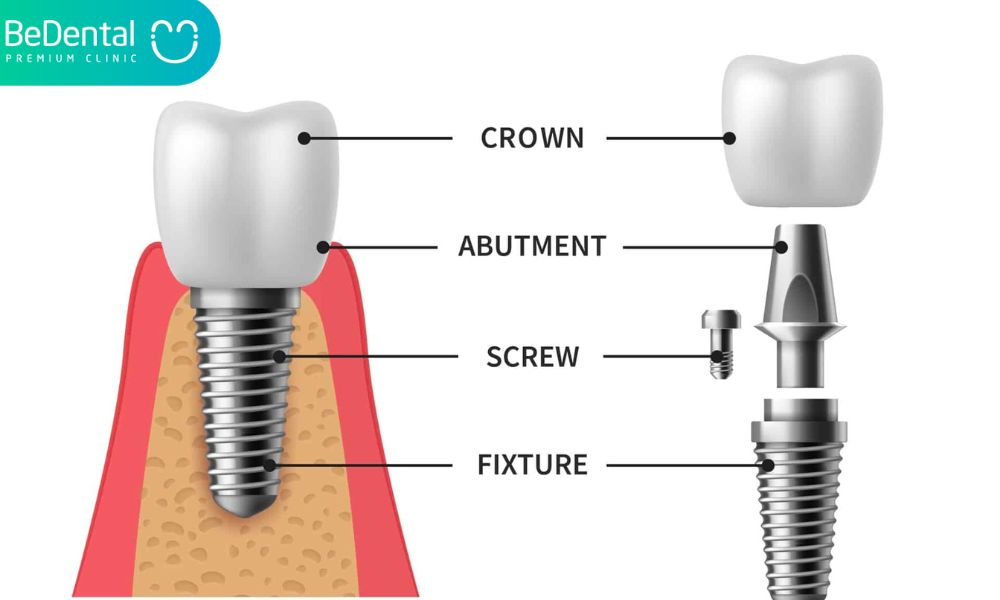
The choice ultimately boils down to what is best for your particular circumstance.
Durability
Dental implants are the undisputed winner. Although they require more upkeep and have a longer lifespan than bridges, they are also more expensive. In the right hands, dental implants may last a lifetime. Conversely, dental bridges need to be replaced every five to seven years.
If you prefer a more long-lasting treatment, dental implants are the way to go. A dental bridge can be your best choice, nevertheless, if you are not prepared for or able to commit to surgery.
Ease of care
When it comes to convenience, dental implants are the hands-down winner. When you have a bridge, you need to be careful about what you eat and how you clean your teeth since, if not properly maintained, the bridge might become loose. Use implants as normal to brush and floss. There’s no need to stress over employing unique cleaning techniques or avoiding specific meals.
Conclusion
Because of how closely they mimic natural teeth in both look and function, dental implants are the finest solution for replacing lost teeth. Also, they don’t need any specialized maintenance, and with care, they may last a lifetime.
Dental bridges are another effective solution for tooth replacement, however they have significant limitations. They can deteriorate with time because, among other things, they rely on nearby teeth for support. Dental bridges may also be challenging to keep clean and only last for roughly ten years before they need to be replaced.




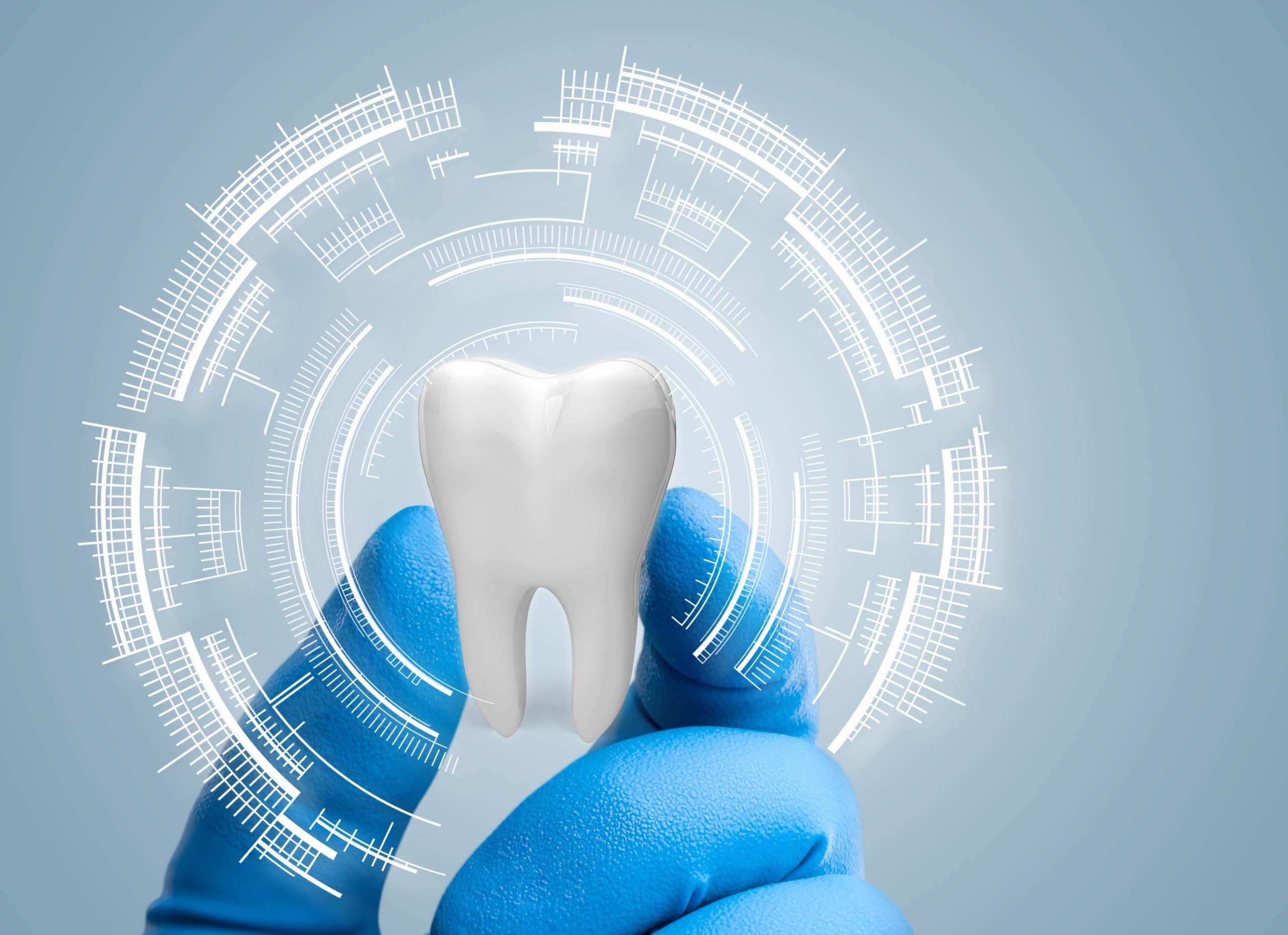
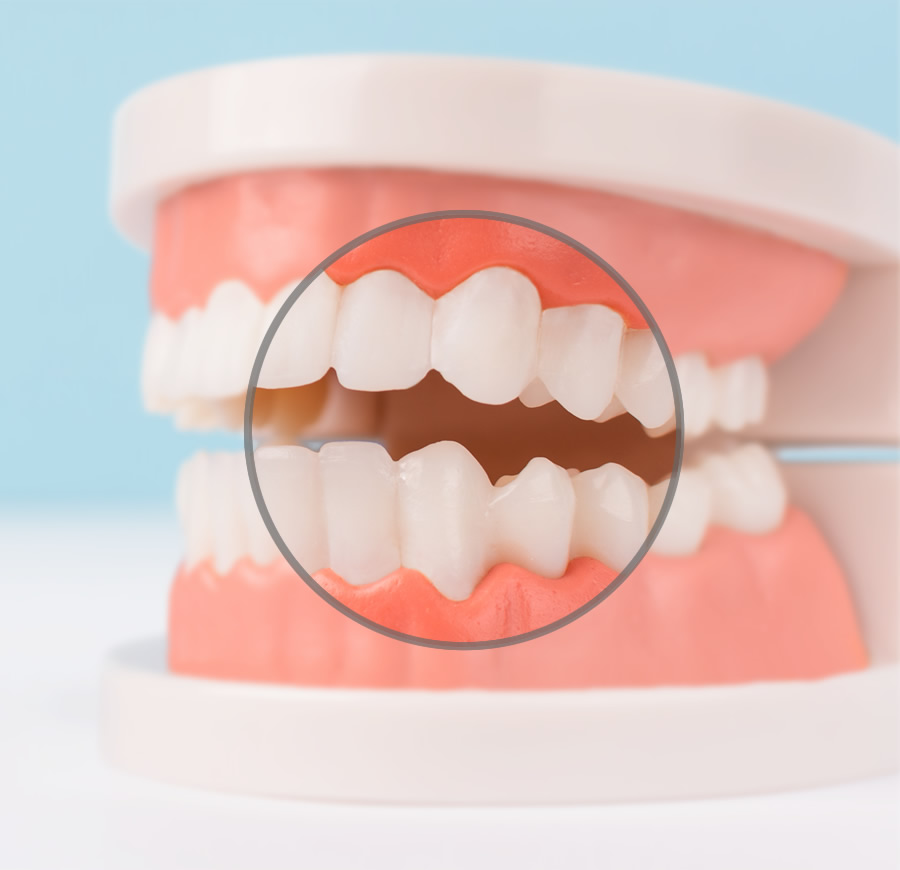
Pingback: Denture renewal and 4 indications you should know – Be Dental
Pingback: A Periodic Dental Check-up: 5+ Things You Should Know – Be Dental
Pingback: What is porcelain crown without tooth grinding? What is the price of porcelain crowns without grinding? – Be Dental